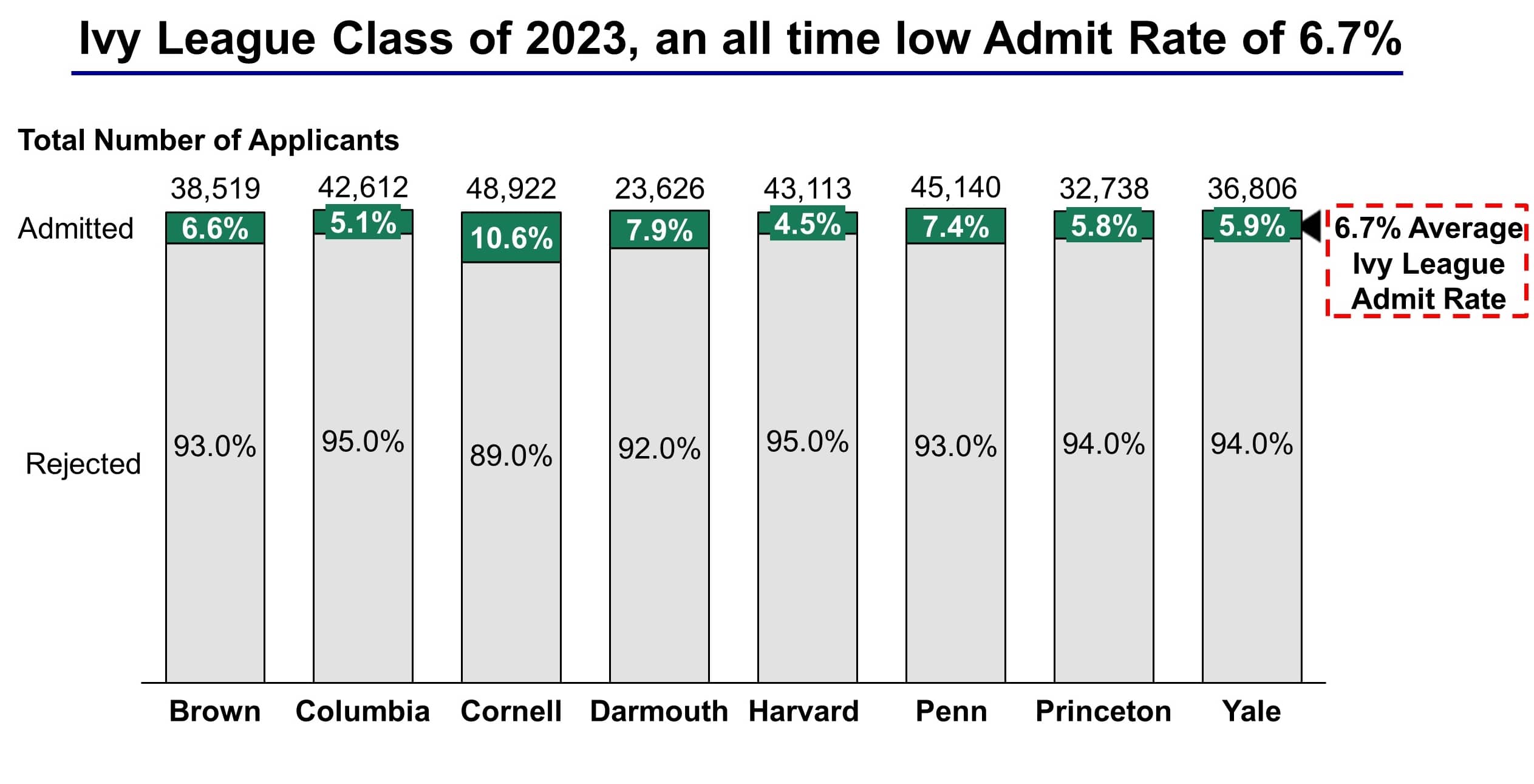These highly prestigious private universities are known for their top-notch academic programs, as well as their hefty tuition rates. Many students dream of attending one of these schools, but the low acceptance rates make it tough to obtain an Ivy League education. Even after taking into account the self-selected sample of students attending elite universities, if you look at the total number of top executives, most did NOT go to Ivy League or highly selective colleges. Examining the current list of acting governors reveals that only 9 out of 50 obtained their undergraduate degrees from Ivy League institutions, and over one-third graduated from public universities.
Furthermore, many graduated from lesser-known schools such as Husson University in Maine, Mercer University in Georgia, Catawba College in North Carolina, and Trinity University in San Antonia, Texas. Students from middle-class families who don't qualify for aid but who also can't pay out of pocket may want to think twice before accepting an Ivy League offer letter. Our analysis suggests these students face an uphill battle when it comes to paying back their student loans.
Compared with graduates of public universities and even private colleges, they must allocate a much higher percentage of their income toward monthly repayments." Furthermore, they also had lower projected mid-career salaries compared to Ivy League and national private university peers, with liberal arts graduates only slightly behind. Graduates from the top liberal arts schools have a lower average debt upon graduation, but both lower early career and mid-career median salaries. Penn students develop the intellectual connections they need to thrive in an ever-changing and complex world.
Working with faculty across a flexible curriculum spanning 4 undergraduate and 12 graduate schools, students develop adaptable, well-rounded minds. The physical proximity of the university's resources make thinking and learning between departments and disciplines a part of everyday life at Penn. From innovative dual degree programs that defy traditional academic boundaries to rigorous grounding in the liberal arts and sciences, Penn is fueled by an open and endless exchange of ideas. Next, we multiplied the rate of annual pay growth by the average starting salary for alumni who earn a bachelor's degree and do not go on to earn additional degrees.
In order to calculate starting salaries, we used PayScale's data on median salaries for alumni with zero to five years of work experience. We then took early salary averages for graduates of the eight Ivy League schools, 1,050 private colleges, and 604 public colleges. Harvard University, founded in 1636, is the country's oldest university and one of the most prestigious in the Ivy League. It is a medium-sized university with approximately 7,000 undergraduate students.
Harvard is a private academic university with over 100 research facilities on campus. In addition, the university has one of the best freshman retention rates in the country. The University of Pennsylvania usually known as "Penn," is a public research university in Philadelphia, Pennsylvania.
Why Ivy League Schools Are Bad It is a huge school, with an average of 10,000 undergraduate students, and it is competitive, nursing, economics, and finance are among the most popular degrees at Penn, which is ranked as the best business school in the country. The University of Pennsylvania, which was founded in part by Benjamin Franklin, offers a mix of world-class liberal arts coursework and pre-professional education. It is a collegiate athletic conference in the United States that consists of eight private academic universities in the Northeast.
Beyond athletics, the name "Ivy League" is commonly used to refer to the eight schools as a group of elite colleges with implications of academic brilliance, admissions selectivity, and social elitism. Ivy League universities are frequently regarded as the gold standard of higher education in the United States and around the world. Ivy League schools are among the most prestigious and the most sought-after colleges and universities in the United States and around the world. Harvard University is probably the most well-known Ivy League school. It is located in Cambridge, Massachusetts, and is a medium-sized school with around 7,000 undergrad enrollments. Harvard is also a very competitive school as the acceptance rate is only 5%.
Accepted students' SAT grades typically range from 1460 to 1580, and their ACT grades range between 33 and 35. Harvard is rated #1 for biology studies and political science studies according to Niche's 2020 Best Colleges. University of the People is a member ofHarvard Business School Online's (HBS Online's) Collaborating Colleges program. Harvard Business School Online offers a unique and highly engaging way to learn vital business concepts via an innovative online platform that brings the Harvard Business School classroom to you. As the smallest of the Ivy League schools, Dartmouth College enrolls just under 4,500 undergraduate students per year. Founded in 1769, the school is home to undergraduate schools of engineering, arts, and sciences as well as graduate programs in business, medicine, and engineering.
Despite its impressive academic offerings, the school manages to maintain a quaint and intimate feel. The student to faculty ratio is just 7 to 1, meaning students have the potential to receive a fair amount of individualized instruction and one-on-one mentoring from professors. Located in New York, New York, Columbia University is one of the oldest and most respected post-secondary academic institutions in the United States. Known for its excellent undergraduate programs in engineering and computer science, the school is also an active research hub that welcomes a diverse student body and faculty.
In sharp contrast to some of the other Ivy League schools , Columbia University relies on a prescribed core curriculum as the basis for its undergraduate program. Regardless of major, all students accepted to the university must take a common set of classes. These classes are rooted in the liberal arts and emphasize oral and written expression. The Ivy League is an athletic conference comprising eight private institutions of higher education in the Northeastern United States.
The conference name is also commonly used to refer to those eight schools as a group. The eight institutions are Brown University, Columbia University, Cornell University, Dartmouth College, Harvard University, Princeton University, the University of Pennsylvania, and Yale University. The term Ivy League also has connotations of academic excellence, selectivity in admissions, and social elitism. In addition, Ivy League schools are often viewed by the public as some of the most prestigious universities worldwide and are often ranked amongst the best universities in the United States and worldwide. All of the Ivy League's institutions place within the top 15 of the U.S.
News & World Report college and university rankings; with five placing in the top six. There is no denying that obtaining an Ivy League education brings with it a sense of name recognition and prestige. These eight private institutions of higher learning are also known for their selective admissions processes, making them sought-after destinations for the best and brightest students. And another study showed that students from low-income backgrounds who attend elite colleges on average earn more than those from low-income backgrounds who attend less prestigious schools. Attending an Ivy League college can also provide students with an edge if they decide to apply to graduate school.
An Ivy League education can be a good option for students from lower-income families who qualify for financial aid; the opportunity could change the trajectory of their lives. In fact, a 2017 study by economist Raj Chetty concluded that low-incomes students who attend elite colleges are more likely to reach the top 1% of the earnings distribution than those who attend mid-tier public universities. Admission to elite universities has become increasingly competitive. Each year, Ivy League schools and other top colleges advertise their low acceptance rates as a badge of honor. In 2019, Harvard and Columbia accepted a record low number of applicants.
This exclusivity creates a vicious cycle; the more selective schools are, the more students and parents want in. The Ivy League is an American collegiate athletic conference comprising eight private research universities in the Northeastern United States. The term Ivy League is typically used beyond the sports context to refer to the eight schools as a group of elite colleges with connotations of academic excellence, selectivity in admissions, and social elitism. Its members are Brown University, Columbia University, Cornell University, Dartmouth College, Harvard University, the University of Pennsylvania, Princeton University, and Yale University. Cornell University is not only one of the nation's prestigious Ivy League schools, but also the state of New York's land-grant institution. As such, the school is committed to enriching the lives of its students and contributing to the common good of its community, its state, and the world.
Founded in 1865, the university is currently home to more than 15,000 undergraduate students. Though its founding mission is to provide quality education in all academic disciplines, the university is best known for its standout business programs and its undergraduate offerings in engineering and computer science. You may be surprised to learn that for some students, the real value of attending an Ivy League institution is not the school itself, per se. Instead, the best perks come from being immersed in a community of scholars committed to learning at the highest level. It sounds cliché, but the Ivies really do attract the best and brightest students across the nation (and beyond!).
These schools are highly selective and only admit those applicants with the highest grade point averages and college entrance exam scores. This means that their classrooms are filled with some of the most intelligent young minds in existence. Students tend to feed off one another's ideas as they engage in collaborative group projects and lively debates and discussions. This in itself is worth the price of an Ivy League education, according to some alumni.
That 35 percent wage gap still looks pretty big, but those top earning Ivy Leaguers may just be hardworking by nature. It's plausible that the types of students who have what it takes to get into prestigious schools also have what it takes to be successful, no matter where they get their degree. It's also worth noting that many students who graduate from Ivy League schools have other success-bolstering resources at their disposal, like wealth and family connections. Other studies have shown that attending elite private schools does give graduates a financial advantage, especially when measured against the least selective schools.
While the Ivies still have a long way to become more inclusive and supportive institutions, they have made strides in recent years. Previously mentioned generous financial aid policies allow these universities to offer financial support to students from low-income backgrounds. More elite schools have bigger endowments that can help lower, middle, and even upper income students with financial support. With just over 4,000 undergraduate students, it is a relatively modest school when compared to other Ivy League colleges. Dartmouth is quite selective, with a 9% acceptance rate, and accepts students with SAT scores ranging from 1420 to 1560 and ACT scores ranging from 31 to 35.
Georgia Institute of Technology, often referred to as "Georgia Tech," is a located in Atlanta, Georgia. The school offers technology-focused education to more than 25,000 undergraduate and graduate students across six colleges and 28 schools focusing on business, computing, design, engineering, the liberal arts and sciences. Fortunately, these sought-after institutions offer generous financial aid based on a family's ability to pay. In fact, several schools provide admitted students a full ride if their families earn less than $60,000 per year. Some have even adopted financial aid policies built on grants instead of loans so that students can graduate debt-free.
However, Ivy League schools are prohibited from offering athletic or academic scholarships; financial aid is entirely need-based. The third-oldest institution of higher learning in the United States, Yale University, is home to many of the same top-rated academic and professional programs that the other seven Ivies offer. In addition, though, Yale is well-known for its visual and performing arts programs. Another standout feature of this particular Ivy League school is its residential college network.
Upon admission, all undergraduate schools are assigned to one of over a dozen residential colleges within the university system, granting them access to a tight-knit academic community within the bigger Yale experience. Founded by Benjamin Franklin in 1740, the University of Pennsylvania has a long history of academic excellence. Today, the school continues to be ranked among the leading institutions of higher education in the country. It's not the school's reputation that attracts them to its campus for many UPenn students, though. Instead, students who enroll at the university find unparalleled opportunities for extracurricular involvement, social activism, and service-learning.
The strong sense of community at Penn translates to a tight-knit and active alumni network post-graduation. For many graduates, this influential network provides even more value than the degree itself and is worth the somewhat-pricey tuition many times over. While not all Ivy League students graduate with a plethora of professional connections and potential mentors, it can be easier for students to make connections because of small class sizes, Cohen added.
Ivy League colleges typically have robust career development resources and active alumni networks — but the same applies to smaller liberal arts colleges or smaller majors and schools within larger universities. For it to be worth applying to any of these schools, you should be performing at a very high level academically. Even at the Ivies with acceptance rates above 8 percent , serious applicants have very impressive high school transcripts and test scores. At Cornell, for example, the average SAT score for admitted students is a 1480.
The truth is that Ivy League colleges don't always have the highest quality of instruction for undergraduate students. Overall, they tend to be very focused on doing academic research to maintain their position at the forefront of academia. Professors may be less interested in teaching than they are in their personal projects; alternatively, schools may end up hiring tons of adjunct faculty to keep costs down. You could end up with a better learning experience at a small, highly selective college that exclusively enrolls undergraduate students because the professors are there primarily to teach. When application season begins for high school seniors, it's hard to avoid the pressure to apply for – and get into – an Ivy League college. If the long list of successful Ivy League graduates isn't enough, the pride warranted by a thick acceptance packet from a top-ranked, highly-selective school might tempt anyone to give the most prestigious schools a shot.
But are Ivy League and other high-pressure, prestigious colleges really worth it? Read on to learn more about Ivy League and other highly-touted colleges, what it takes to get in and whether or not they're the best option for you. Although it may not be the case with other higher learning institutions, the Penn LPS Online platform was specifically designed to make the Ivy League experience accessible and affordable to working adults. If you're motivated to pursue a high-quality liberal arts education at Penn LPS Online but are wary of the costs, you can learn more about reduced tuition rates, financial aid, and payment plans that may be available if you qualify.
While the Ivies still have a long way to go toward becoming more inclusive and supportive institutions, they have made strides in recent years. Previously mentioned generous financial aid policies allow these universities to offer financial support to students from low income backgrounds. This means that the national average college graduate had almost double the student debt of the average college graduate from the top Ivy Leagues, public universities, national private universities, and liberal arts colleges. All of these benefits of smaller liberal arts colleges come at, on average, significantly lower costs than that of an Ivy League. For example, for a college like Williams, graduates earn an average Early Career Pay of $70,600 and an average Mid-Career Pay of $150,300, with the cost of attending with tuition being ...
To go with their prestige, the Ivy League colleges are very expensive , highly competitive and have some of the lowest acceptance rates. Year in year out, they get a large number of students applying for their programs. There are eight Ivy League Colleges, and not all of them have a medical school.
The institution was founded in 1746, making it the fourth oldest university in the United States. It is a medium-sized institution with around 5,000 undergraduate enrollments, and like Harvard, has an extremely competitive acceptance rate of only 5%. Some of its most popular degrees include computer engineering, public policy analysis, and economics. It is rated #2 of the best colleges in America to study political science and public policy analysis.
SAT grades range from 1440 to 1570 and ACT grades range between 32 and 35. Columbia University is tied with Harvard for the No. 2 spot on the list of best national universities. Columbia received a total of 60,551 undergraduate applications and accepted 2,358 students for a 3.9% acceptance rate. This system is exacerbating inequality, retarding social mobility, perpetuating privilege, and creating an elite that is isolated from the society that it's supposed to lead. In 1985, 46 percent of incoming freshmen at the 250 most selective colleges came from the top quarter of the income distribution. As of 2006, only about 15 percent of students at the most competitive schools came from the bottom half.















































